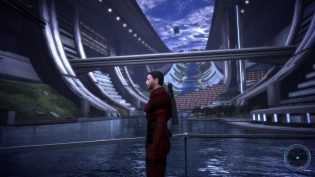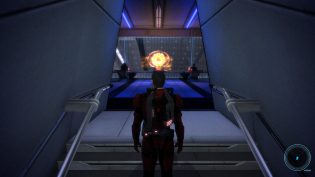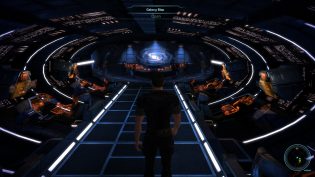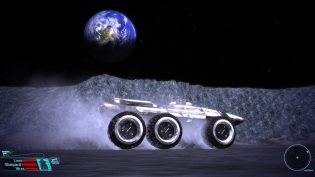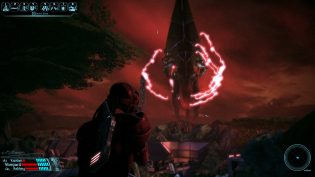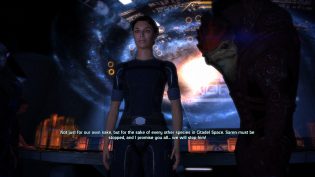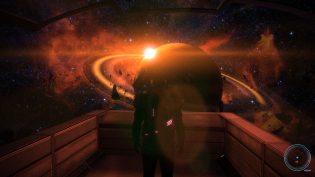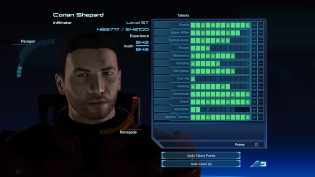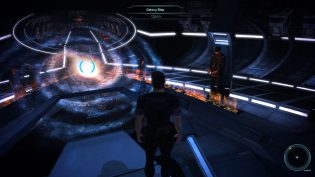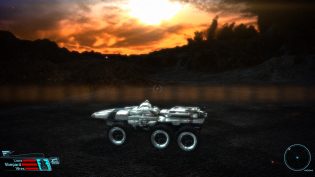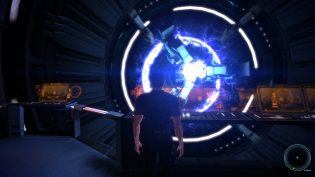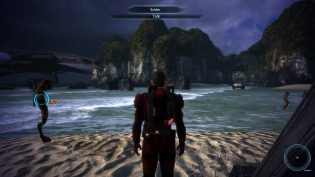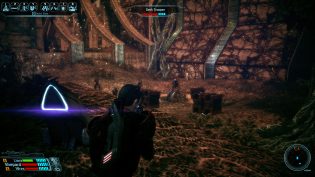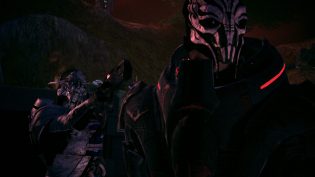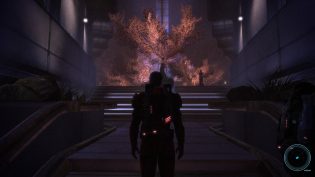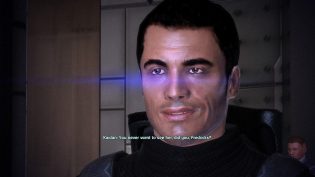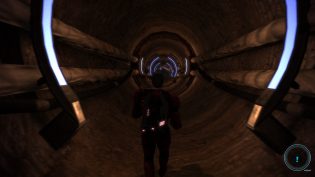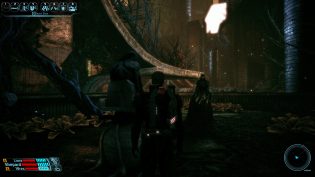Yes, it has been more than 10 years already, hard to believe as it may be, since Mass Effect was originally released. First exclusively on Xbox 360, then, half a year later on PC (PS3 version didn’t come until 2012, though). Despite BioWare setting a new example, a new milestone in how to make story driven RPGs with almost every game prior to this one, it was Mass Effect specifically that became a template for so many games to follow. A cinematic, character and story driven, action and dialogue focused RPG that tried to please varied audience on different platforms without compromising on its values. A game so fresh, yet so distinctively BioWare.
Playing it today on PC it’s easy to see why it was loved and why other games tried to copy it. Also easy to notice things that hasn’t aged well or were not good in the first place.
If there is one way I could describe how Mass Effect differs from the rest of the trilogy, I’d say that it’s a “game by sci-fi and space nerds for sci-fi and space nerds”. It’s felt in everything, from its 80s synth soundtrack-like main theme (that, along with some story bits and races clearly references Babylon 5), to the excitement of exploring different parts of the Milky Way galaxy full of stories and themes that were brought up countless times in sci-fi media before. Every planet has a bit of story to it, every encounter, every mission or assignment bringing the familiar sci-fi goodness to interactive format. Being more or less scientifically explainable and yet extremely pulp and cheesy for the sake of being cinematic. Going into technical explanation of how things are and why they became like this (should you choose to read or listen), yet also showing the Big Bad being angry in his Evil Lair from multiple angles. Having placement for each weapon on characters to show the idea of military standards, introducing heat-dissipation weapons to make it easier to explain how you can use ranged weaponry in any part of the galaxy. But also having most races rather humanoid in looks and thoughts, having human race as the only one very diversified within itself and hand waving the ability to talk to everyone with babel fish-like universal translators that absolutely everyone has.
Mass Effect 1 clearly tried to do many things. There are multiple planets to explore, each having its own feel, its own look and atmosphere, its own little assignment to do while you’re riding on your durable and gravity defying M35 Mako vehicle. There are many moments where your choice can shape not just your relationship with your squadmates, but the future of different places and races in the world, something that was planned to be followed up in the sequels. Which was clearly difficult to do while sticking to the idea of having a very clearly defined story of a very clearly defined character, yet leaving a lot of details to player choice. The desire to be cinematic also went farther than just having film grain, color correction and shaky cam cutscenes, but also into rethinking the dialogue system and trying to mix the RPG mechanics with the third person cover shooter gameplay. Having all that nerdy stuff, all that lore, the backstory, the Big Picture of the world both visible, yet not overwhelming to the players. And being both a title that can be casually played or going deep into RPG mechanics and the story.
Having all of this in one game haven’t really been attempted before. And even though there were countless games that emulated some of the ideas from Mass Effect, not many have attempted and succeeded at doing all of this ever since, with the closest example I can think of being The Witcher 3. But, of course, Mass Effect itself didn’t do everything right on its first try either. Many things were pretty annoying even after being updated in the PC version, and some just feel dated by today’s standards.
The exploration aspect, for example, while seemingly honestly aiming to make you feel like you’re exploring the galaxy and not just giving you a bunch of checklist-like areas (like more recent games, including ones from BioWare, tend to do), is not particularly well made. While planets may look different, having amazing and unique feel, they all play exactly the same – drop in a Mako, drive across frustrating to drive across terrain, find stuff, maybe go into a base that looks exactly like any other base you can find on other planets, kill someone (sometimes just talk to someone), go back to your ship Normandy SR-1, fly to the next planet and repeat. Occasionally you may stumble upon a memorable little assignment about madness in space or uncovering unethical experiments of a powerful unknown organization called Cerberus (that returns, re-imagined quite a few times, in sequels). But more likely scenario is being asked to fly to 5 planets and kill all Geth (AI war machines) on them, or stumbling upon a ship full of Husks (cyberzombies made by Geth, essentially) with the backstory of those things being “well, here they are, so you need to kill them”.
And it truly is so BioWare at times it’s funny. Ever since Neverwinter Nights, the company started pushing heavily in the direction of both more jRPG-like companion stories and the Monkey Island 2-like “Three Trials” where the player will get 3 destinations to check in any order they want, all more or less self-contained and allowing for going the other direction if the player gets stuck or bored in one of them. Even the Paragon/Renegade system, while trying to no longer be similar to Light/Dark side (from KOTOR) or Open Palm/Closed fist (Jade Empire), where the ideas closer represented Evil/Good alignments in D&D, it was still very much D&D-like, but closer to Lawful/Chaotic. Being a “by the book” space cop or the “loose cannon” space cop. And still could lock people into min-maxing the character’s “morality”, rather than playing a character that might lean towards some principles more closely, than to others.
The combat was no better. The idea of having 6 classes (3 pure and 3 mixed) which more or less correspond to the classic Warrior, Thief, Mage and their dual-class variants (but sci-fi) wasn’t bad – even sequels to Mass Effect show how interesting and varied the classes can be. But the over-reliance on “hidden rolls” based on your skills and equipment, rather then on player skill and equipment, in a game that wanted to play as a TPS meant that most fights felt tedious and most enemies were bullet sponges with no real strategy applied to fighting them. The heat system instead of the ammo was also such an amazing concept, yet until you get better items and skills, and because of the bullet sponge nature of fights, it just added to the frustration.
And the skills and equipment felt messy. Endless types of weapons and upgrades with numbers tied to them, both important and pointless, all tied to your level and all not really making the combat more fun – quicker at best. Only social and biotic-/hacking-based skills were of any interest, and even those felt not particularly fun to upgrade (or use), while combat/equipment unlock skills were just silly. Inventory was a mess with limited space and hard to navigate menus, lots of things to deal with.
Even the main locations, should you ignore all the secondary objectives, felt rather primitive and small even for 2007. Only the Citadel felt truly alive and amazing, despite the need to constantly ride elevators (or use rather slow cumbersome quick travel), while all the other destinations felt really small. They tried to be visually varied, and the game’s visual style still holds up despite being rather technologically outdated and showing the issues of all early Unreal Engine 3 games (blurry textures and such). But it often felt hard to be excited about a corporate colony when it consisted of two small rooms with barely anyone in, one outdoors driving section and series of samey looking laboratory locations. It hinted at having more behind the scenes, but it felt like a serious step back after the locations in some of the previous BioWare titles that had a more believable scale. Hell, they felt wrong even when compared to its own Citadel or the exploration of planets.
And some things just aged badly or are just an example of the PC port being rather average. The normal running speed, for example, is painfully slow for most areas and sprinting is only available in combat. Dialogue with companions/NPCs on Normandy is shockingly limited, compared to the later games. It was also the first BioWare game to have the issue of talking nicely and friendly to “romance-able” characters suddenly locking you into romance with them with little to no ability to say “what?! no!”. Game can start running rather poorly the longer your play session is. The DLCs were, quite literally, hit and miss. The first (Bring down the Sky) being a pretty good story assignment that has shown what the future games will do for all side-quests. The second (Pinnacle Station) was so absolutely atrocious I refused to replay it after completing it once back in 2008, and the one that seems to have been pretty much forgotten and pushed under a rug since then. If you are curious, it was just a bunch of terrible arenas versus terrible AI and almost no story whatsoever tied to it all. The minigames you have to do in the game are terrible and usually make no sense since many unrelated actions require the exact same minigame what is never fun (though can be skipped with omni-gel items in most cases). And did I already mention the use of elevators to hide level loading? An amazing idea that, sadly, led to frustrating results.
Yet, here I was, replying the game with my Paragon character for the n-th time and casually checking out on my other 2 characters to remind myself of many variables in the story. Talking to companions which might’ve been not as well developed as they would become later, but were already extremely interesting. Reading through all of the ideas thrown at you, facing some pretty interesting dilemmas, feeling excited about mysteries to which I already know the answer, because a lot of times the way they were presented here, in the original game, simply felt better and more exciting than the eventual reveal would turn out to be. Oh and all of that while being constantly mesmerized by the amazing soundtrack by Jack Wall and Sam Hulick, which has been part of my main playlist since 2008 as it just never gets old.
Hell, some of the questions and concepts are even better presented here than anywhere else in the trilogy. The politics, the xenophobia, being a “space cop”, exploring the galaxy – all of this will take back seat to cinematic action storytelling in the second and third games. Games that would feel far less adventurous, having far lesser scopes (but be better in some other ways). One of my other Shepards, for example, is an opportunistic, careerist xenophobe who only went for things that can benefit their status and humanity, yet still save the day – something I’ve tried not expecting it to work story-wise, yet it still did. Which has shown that despite the issues with the “morality” system in the game, it still expected and allowed for your Shepard to be not just a “very good cop” or a “very bad renegade cop”, but anything else that can resonate with the game’s choices and themes.
Mass Effect is fun to play in 2018 because of what it wanted to be and what it wanted to do. The drive the game has makes it easier to excuse its many missteps, but it is getting harder to enjoy it as much as you could 10 years ago. A remake/remaster of the game would be most welcome, yet hard to imagine since leaving most things as is would lead to the game being not as good as its scope wanted it to be, but updating the things to be better than they originally were would require a lot of work. It’s a game that impresses even today and a game that I would easily recommend playing if you have never played it before and like story driven action RPG titles and sci-fi. And it’s a game I would easily recommend replaying if have not played it in years and loved the space, the exploration and the story and can excuse the game’s action and slightly repetitive nature. It remains my favorite Mass Effect game and I was glad to replay it one more time.


